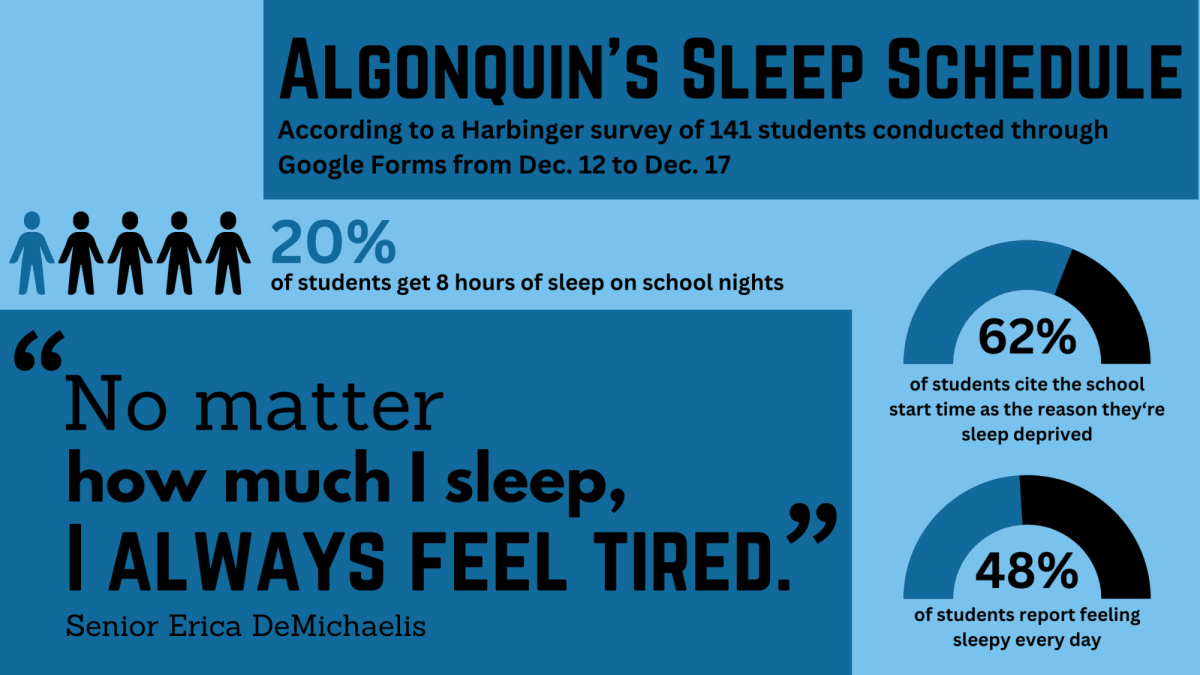While Algonquin students are getting more sleep, four years after shifting to a later start time, many still struggle from being overwhelmed with work and finding time to get extra help after school.
In the fall of 2021 ARHS introduced a new schedule, shifting from a 7:20 a.m. to 8 a.m. start time, in order to help students get more sleep at night and get to school on time. The bell schedule has also become rotational, with each period meeting at a different time each day in the cycle.
Principal Sean Bevan believes the later start and especially the rotational schedule have made a positive impact on student classes.
“Students who had a hard time arriving at school on time really struggled in the first two classes because the impact of the later arrival impacted two classes heavily but not the other classes,” Bevan said.
The new schedule and later start time has impacted student sleep in a positive way. According to a Harbinger survey of 141 students conducted through Google Forms from Dec. 12 to Dec. 17, 20% of respondents say they get eight or more hours of sleep on school nights, compared with 15% who reported eight or more hours of sleep in a 2019 Harbinger survey. In the same surveys, the number of students who felt sleepy every day in school decreased from 55% in 2019 to 48% in 2023.
“I have anecdotally noted students are perkier and more engaged in school at 8 o’clock than 7:30,” Bevan said.
Social Studies teacher Dr. Christina Smith has observed that fewer students are tardy or absent with the later start time.
“I like having the 8 o’clock start time; it gives the student a little bit of time in the morning to wake up,” Smith said.
According to the recent Harbinger survey, the three leading reasons students say they don’t get enough sleep are homework at 84%, technology at 73% and school start time at 62%.
Senior Erica DeMichaelis gets around seven hours of sleep each night and enjoys the extra time the schedule provides at the end of the day, but DeMichaelis still is drained during school.
“No matter how much I sleep, I always feel tired,” DeMichaelis said.
Bevan said the main argument against the new schedule was that by moving the time to 8 o’clock, students would just stay up longer. However, Bevan shared that science does not support that claim.
“Students will actually go to sleep around the same time regardless of what the start time is, and so getting that extra half hour of sleep is going to be beneficial and students aren’t going to stay up a half an hour later,” Bevan said.
Bevan believes the only negative impact of the later start time is the impact it has on extracurricular activities and some students accessing extra help, especially athletes. He explained that the time between the end of the school day and beginning of sports went from around an hour to 25-30 minutes.
“That’s not a lot of time to get extra help,” Bevan said. “So that has been an impact students have been struggling with.”
Bevan doesn’t plan to have many changes to the schedule in the near future. The only change he foresees is possibly reversing the rotation of classes.
“I don’t anticipate we’ll do any major changes, what we’re considering is keeping the exact same schedule and the only two options we are contemplating at all is either keeping this exact schedule or just reversing rotations,” Bevan said.











